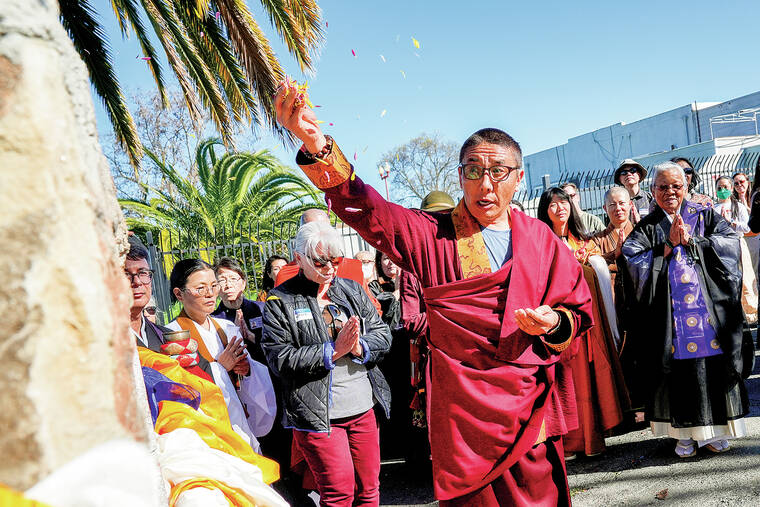Buddhists use karmic healing against one US city’s anti-Asian legacy and nationwide prejudice today
ANTIOCH, Calif. — For one afternoon, on Antioch’s main street and tranquil riverbank, the fragrance of burning incense was paired with the sound of Buddhist and Tao chants. Their cumulative calming energy was meant to be a balm of sorts to soothe the racial and religious hate that cast a shadow on Antioch’s legacy.
Antioch’s dark past, specifically its horrific mistreatment of early Chinese immigrants, motivated about 200 Buddhists to undertake a recent pilgrimage to the city of about 115,000, tucked deep in the delta that drains into the San Francisco Bay. Their goal was to supplant the negative with the positive by reconciling a dreadful past and anxiety-filled present — both time periods when Asian Americans nationwide have faced hate and discrimination — with the hope for a more egalitarian and harmonious future.
ADVERTISING
In the 1800s, thousands of Chinese immigrants came to the area during the gold rush to work in mines, and build railroads and levees. Those who lived in Antioch were subject to sundown laws and used secret tunnels to commute to and from work, according to local newspaper reports. Eventually, the city’s Chinatown spanning a couple of city blocks — which also housed a Buddhist/Tao temple where new immigrants congregated — was burned down.
On Saturday, the group of Buddhists gathered for the pilgrimage, an event they titled “May We Gather.” It was intentionally scheduled on the third anniversary of the Atlanta mass shooting when a white gunman targeted female employees at Asian American massage parlors because he saw them as “sources of temptation.” Six of the eight victims were women of Asian descent.
Duncan Williams, a Soto Zen priest of Japanese descent and one of the event’s organizers, said the Atlanta killings bore eerie similarity to Antioch in 1876 when raging locals burned down the homes of Chinese women branded as sex workers. In 2021, Antioch became the first U.S. city to issue a public apology for the mistreatment of early Chinese immigrants during the gold rush.
Williams, who also is a religion professor at the University of Southern California, said event organizers desired not just a political reaction, but “a Buddhist response that draws on our teachings and practice,” which aims to honor ancestors and heal racial trauma, past and present.
So in Antioch’s El Campanil Theatre, a gathering of Buddhist monks and leaders from across the diaspora engaged in a process of “karmic healing.” They offered chants and prayers at the altar of the thousand-armed Guan Yin, the goddess of mercy and compassion. Four tablets rested at the altar bearing the names of victims of hate and violence.
The Buddhists in attendance came from various countries and traditions — Chinese, Vietnamese, Japanese, Korean, Laotian, Thai, Tibetan, Indian and Sri Lankan. Holy chants rang out in multiple languages including Pali, the antiquated language closest to what the Buddha himself spoke.
Grace Song, an ordained minister and a department chair at the Won Institute of Graduate Studies in Warminster, Pennsylvania, said she had never been part of a peace-building event that celebrated diverse Buddhist traditions until now.
“I hope we get closer, build solidarity and support each other as we deepen our roots in this country,” she said.
Khenpo Paljor, a Tibetan lama from Des Moines, Iowa, offered prayers at the Birthplace of Antioch marker erected in 1850 by the first European settlers. Here, attendees placed multi-colored Tibetan kata, which are traditional prayer scarves. Williams said the colored scarves reflect a Buddhist scripture that speaks of pure souls as colored lights shining in unison, with none canceling out the others.
For Cristina Moon, a Honolulu-based Zen priest, karmic healing is the process of changing “our relationship to what happened and the ways in which we can control how to act in the future.”
“It’s important we recognize what happened and acknowledge it’s uncomfortable,” she said. “It’s about not getting stuck in a painful past but moving forward in a positive manner.”
Russell Jeung, co-founder of Stop AAPI Hate, sees these Buddhist ceremonies as Asian Americans reclaiming their traditions to recover in “the face of moral injury.”
“When Trump mocked Asians and stigmatized the group by calling (COVID) ‘the Chinese virus,’ that really is a case of moral injury, where we as Americans are betrayed by our elected officials,” Jeung said.
Hatred of the Chinese during the gold rush was fueled by political rhetoric as well. The only article that addressed a racial or ethnic group in California’s constitution, which was ratified in 1879, stated that “no Chinese shall be employed on any State, county, municipal or other public work, except in punishment for crime.” The Chinese Exclusion Act of 1882 barred Chinese laborers from immigrating.
Kaishin Victory Matsui, a priest at the Brooklyn Zen Center, said faith can be used as a way to heal the harm of racism.
“We come to these historic sites where trauma has occurred to bring peace and healing,” she said. “The idea is to remember the past so it is not forgotten. This event connects Asians across time and ethnicity, and reminds us of how vast and powerful we are.”


